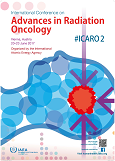Speaker
Eduardo Rosenblatt
(IAEA)
Description
NEED FOR COMPETENCY-BASED RADIATION ONCOLOGY EDUCATION FROM A GLOBAL HEALTH PERSPECTIVE
Eduardo Rosenblatt, Gregorius Ben Prajogi, Michael Barton, Elena Fidarova, Jesper G. Eriksen, Bruce Haffty, Barbara Ann Millar, Anita Bustam, Eduardo Zubizarreta, May Abdel-Wahab.
Although not a new concept in itself, competency-based education has set the trend for the globally accepted standard norm for education and training of medical professionals including postgraduate medical education in radiation oncology. Societal needs demand from radiation oncologists that they be not only competent in the knowledge and skills relevant to their specific discipline (be a medical expert), but that they also display competencies such as professionalism, scholarship, health advocacy, management/leadership, collaboration and communication.
The realities of developing countries, in particular lower-middle income and low-income countries set different priorities than high income countries. A large proportion of cancer patients do not have access to adequate radiotherapy services. Resource constraints determine limitations in equipment, accessories, and dosimetry. Lower than standard staffing levels and limited quality education and training also contribute to substandard care and clinical outcomes. In this environment, the addition and assessment of competency based elements to training programmes can be challenging. On the other hand, it is precisely in these countries, where competencies such as the ones listed above are highly needed in the radiation oncology profession.
Various models and best practices are already available to assist implementation of competency-based education in radiation oncology, making it unnecessary to re-invent them. However, it would be useful for radiation oncologists in charge of education and training in LMICs to review and adapt them in accordance to the daily realities faced in their countries. It is strongly recommended that this initiative be aligned with the larger picture of nation-wide changes in medical education that might already be in motion, or in the absence of such changes, to involve major stakeholders to play an active role in the process. Effective change-management strategies will need to be applied throughout the implementation process, while keeping a focus on a clearly defined goal. In order to provide these goals and milestones, prior assessment involving key stakeholders will be an indispensable first step that must be taken in order to enable informed decisions to be made during the course of implementation.
Since 2009, the Division of Human Health of IAEA has adopted a pragmatic approach to planning, developing, implementing and evaluating education and training programs. This approach emphasizes that more attention should be given to actionable components of the process: mapping the curriculum, writing measurable learning outcomes, designing and planning relevant courses, selecting effective approaches to learning and assessment, and ensuring continuous development through program evaluation.
Outcomes, contents, approaches in instructional methods, learning opportunities and assessment of competencies will need to be wisely chosen, developed and adapted within the context of local needs and available resources to ensure effective implementation. Fortunately, most of the workplace-based assessment methods have been made with time constraints in mind, which should make their implementation more manageable. The utilization of information technology, while requiring a certain amount of commitment and upfront investment, will assist in the management of the significant amount of assessment data that will be produced.
Implementation of competency-based medical education in the education of radiation oncologists in LMICs is both a need and a challenge. The available frameworks and competencies, despite being very relevant to the realities faced by radiation oncologists in LMICs, will still need to be adapted in order to ensure effective implementation at the regional/national level. Radiation oncologists need to employ effective change-management strategies to ensure that the changes which are introduced can remain sustainable within the context of national healthcare, education and political systems.
| Institution | International Atomic Energy Agency |
|---|---|
| Country | Austria |
Author
Eduardo Rosenblatt
(IAEA)
Co-authors
Anita Bustam
Barbara Ann Millar
Bruce Haffty
Eduardo Zubizarreta
(IAEA, Vienna, Austria)
Elena Fidarova
(IAEA)
Gregorius Ben Prajogi
Jesper G. Eriksen
May Abdel-Wahab
(IAEA, Vienna, Austria)
Michael Barton
(Ingham Institute, Sydney Australia)

